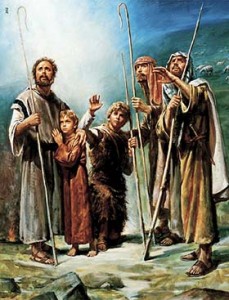Before Amen {At Advent}
An Advent study on prayer adapted from the book Before Amen by Max Lucado
Father,
You are good.
I need your help. Heal me and forgive me.
They need help.
Thank you.
In Jesus’ name, amen.
Day 3: Heal Me. Forgive Me.
At the beginning of this study, I introduced a passage from the book of James about prayer. We learned that since God is good, we should pray, whether we are suffering or cheerful. The rest of the passage in James goes on to talk about healing prayer and the forgiveness of sins. It says in James 5:14-16,
“Is anyone among you sick? Let him call for the elders of the church, and let them pray over him, anointing him with oil in the name of the Lord. And the prayer of faith will save the one who is sick, and the Lord will raise him up. And if he has committed sins, he will be forgiven. Therefore, confess your sins to one another and pray for one another, that you may be healed. The prayer of a righteous person has great power as it is working.”
God’s power is at work in our prayers, and like Max Lucado says in his book, “God’s goal for you is wholeness.”
When we learned about Zechariah’s prayer in the temple, we saw how God heard his prayer, and met with Zechariah at the altar of prayer, and worked His power to answer his prayer.
The temple was a busy place for the Jewish community. There were lots of animals and lots of people. The animals were for the different sacrifices required by the people to stay right before God.
There were special flocks, kept separate from the general flocks, for the purpose of purified sacrifices and they were kept by temple shepherds, not just hired field hands. There was an order to following God’s plan for righteousness. Faithful prayer and sacrificial blood went together.
Near Bethlehem was a tower called the “Tower of the Flock”, or the “Tower of Eder”. There is a Messianic prophecy in the book of Micah concerning this tower that reads,
“And you, O tower of the flock, hill of the daughter of Zion, to you shall it come, the former dominion shall come, kingship for the daughter of Jerusalem.” – Micah 4:8
Dr. Charlie Dyer, an Old Testament scholar, a professor at large at Moody Bible Institute, and host of “The Land and the Book” writes,
“The flocks kept at Migdal Eder (The tower of the flock) were destined for Temple sacrifice. The shepherds keeping watch over these sheep knew the purpose for the lambs under their care. And their job was to keep the animals under them from becoming injured or blemished. It was to those watching over animals destined for temple sacrifice that the angels announced Jesus’s birth.1
The shepherds were keeping watch over purified lambs near a tower in Bethlehem called, the flock, that was part of a Messianic prophecy some four hundred years earlier. The story in Luke reads like this,
“And in the same region there were shepherds out in the field, keeping watch over their flock by night. And an angel of the Lord appeared to them, and the glory of the Lord shone around them, and they were filled with great fear. And the angel said to them, ‘Fear not, for behold, I bring you good news of great joy that will be for all the people. For unto you is born this day in the city of David a Savior, who is Christ the Lord. And this will be a sign for you: you will find a baby wrapped in swaddling cloths and lying in a manger.’ And suddenly there was with the angel a multitude of the heavenly host praising God and saying, ‘Glory to God in the highest, and on earth peace among those with whom He is pleased!’
“When the angels went away from them into heaven, the shepherds said to one another, ‘Let us go over to Bethlehem and see this thing that has happened, which the Lord has made known to us.’ And they went with haste and found Mary and Joseph, and the baby lying in a manger. And when they saw it, they made known the saying that had been told them concerning this child. And all who heard it wondered at what the shepherds told them. But Mary treasured up all these things, pondering them in her heart. And the shepherds returned, glorifying and praising God for all they had heard and seen, as it had been told them.”
Luke 2:8-20
These were “Good Shepherds.” Their service and dedication was to the sheep that were meant for the temple. We learn from John’s gospel in the tenth chapter that Jesus called himself the good shepherd.
“I am the good shepherd. The good shepherd lays down his life for the sheep.” – John 10:11
We need someone to help us, to sacrifice for us, to lay down their life for us and heal us. We are sick, physically and spiritually. Ever since Adam and Eve were banished from Eden, the world has suffered the destructive effects of sin.
Lucado says, “Sickness and sin still stalk our planet. But here is the difference: neither sin nor sickness will have dominion over God’s people. Sin cannot condemn us. Disease cannot destroy us. Guilt is defanged, and death has lost its sting. In fact, the very sin and sickness that Satan intends for evil, God redeems for good. Sin becomes a showcase of his grace. Sickness becomes a demonstration of God’s ability to heal.”
Praying for help to be healed requires mature faith in the power of God.
We are told in James chapter 5 that when we are sick, we should go to the elders for prayer. Prayer, the laying on of hands, and anointing oil, covers your sickness. When we pray, God hears us and meets us where we are. “He will heal you – instantly, or gradually, or ultimately,” Lucado says.
And just like James tells us, Lucado reminds us that “If Jesus heals you instantly, praise him. If you are still waiting for healing, trust him. Your suffering is your sermon.” We need faithful prayer to be physically healed.
We also need faithful prayer and forgiveness to be spiritually healed. God sent his son to earth, and the first people He announced it to were the shepherds.
His son came as a good shepherd, to sacrifice his life for the forgiveness of sins, and because of God’s goodness, the Easter story is the very first act in the Christmas story. The temple shepherds guarding the sacrificial lambs, left their flocks to worship the Sacrificial Lamb.
Could you imagine if there was snow on the ground while the shepherds were in the field? And when the glory of the Lord shown down on them, the light that would have reflected and the brightness of the heavenly host would have made the nighttime look brighter than daytime!
Snow is mentioned only a handful of times in Scripture; one of them is in Isaiah when he is talking about the forgiveness of sins. Isaiah 1:18 says, “No matter how deep the stain of your sins, I can take it out and make you as clean as freshly fallen snow.” (TLB) Jesus’ sacrifice makes us so clean and purified that we can be presented to God with robes as white as snow.
Luke tells us that what the shepherds heard and saw that night was so amazing they couldn’t keep it to themselves. They told everyone they could. They announced Jesus’ birth all the way through town back to their flocks.
Lucado says, “Isaiah did not know the name of God’s sin bearer. But we do. Jesus Christ. He came to ‘put away sin by the sacrifice of Himself.’ (Hebrews 9:26) He ‘was offered once to bear the sins of many.’ (v. 28)”
When we accept God’s Christmas gift of grace, we unwrap a treasure of forgiveness. The fact that Jesus would offer us, lowly field hands, the opportunity to be His heralds of salvation, is an overwhelmingly humbling gift.
Through prayer, we ask for God’s help to heal us and forgive us and He answers us with a deeper connection and closer relationship with Him allowing us greater access to His power. The same power He used to send His son to earth and that raised Him from the dead.
Psalm 23 is a love poem of a deep connection with our Shepherd. Jesus is guarding us, keeping watch over us, and healing us. We just need to ask him for his help.
“The Lord is my shepherd, I shall not want. He makes me lie down in green pastures. He leads me beside still waters. He restores my soul. He leads me in paths of righteousness for his name’s sake. Even though I walk through the valley of the shadow of death, I will fear no evil. For you are with me; your rod and your staff they comfort me. You prepare a table before me in the presence of my enemies; you anoint my head with oil; my cup overflows. Surely goodness and mercy shall follow me all the days of my life, and I shall dwell in the house of the Lord forever.”
Discussion:
God will answer all prayers for healing by followers of Jesus. Maybe this will happen immediately, maybe over time, and maybe when we see Jesus face-to-face, but healing is on the way. How can we embrace this truth and not become bitter if we don’t get the healing in the timing or the way we might want?
Reflection:
How has God shown up, healed, and delivered me when I have called out to him for help? How can remembering his faithfulness in the past give me confidence to trust him in the future?
Action:
God answers our prayers for healing – but never promised to answer them immediately or exactly as we expect. Make a list of four or five prayers for healing that you have lifted up to God in the past or are presently placing before him.
– After you have written down these prayers, indicate if God answered them quickly, after a time of trusting and patient waiting, or if you are still waiting for an answer.
– Take a moment to thank God for the prayers that he answered “instantly.” Celebrate that there are times when God sees, responds, and in his sovereign power decides to act immediately.


